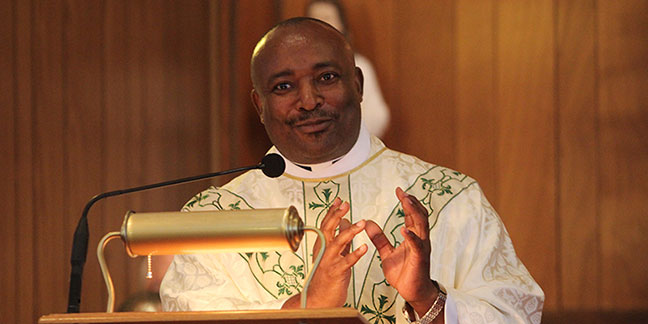 WINSTON-SALEM — Father Basile Sede, Ph.D, pastor of St. Benedict Church in Winston-Salem, will debut his book entitled “Hegel’s Philosophy of History: A Challenge to the African Thinker” on June 24 at Good Shepherd Mission in King.
WINSTON-SALEM — Father Basile Sede, Ph.D, pastor of St. Benedict Church in Winston-Salem, will debut his book entitled “Hegel’s Philosophy of History: A Challenge to the African Thinker” on June 24 at Good Shepherd Mission in King.
Father Sede was ordained 20 years ago for the Diocese of Buea in Cameroon and has served in the Diocese of Charlotte for the past five years. After completing his doctorate at the Pontifical Lateran University in Rome in 2016, he wanted to publish this book to mark his two decades of priestly ministry. The book focuses on religion, politics and cultural diversity in the United States of America.
“The issue of immigration is a pertinent one today, not only to the politicians, but to Christians as well as to all citizens,” Father Sede says. “It is more pertinent to us who are settled here in the United States, considering that most of the immigrants would target America as their final earthly destination.”
“Many people have referred to America as a land for everybody, meaning that ours is the privilege of hosting people from all nations,” he explains.
“My travels so far, and my encounters with different cultures and systems, gives me the certainly of mind that Americans should be the people to understand more the concept of globalization and cultural diversity.”
This is where Father Sede received his inspiration to write the book.
“This work, based on a philosophy of history, invites us all to examine our environment and reflect on where we are now and how best to face our common destiny – especially in this era where, for most thinkers, the leading question is no longer the will of God and divine providence, but the will of man,” he says.
Father Sede notes that Georg Wilhelm Friedrich Hegel and Léopold Senghor are the leading figures in the book, not to limit its scope but to epitomize European and African thought respectively.
Hegel was a 19th century German philosopher and an important figure in German idealism. Senghor was a poet, politician and cultural theorist who served as the first president of Senegal and was associated with the Négritude movement.
“In the United States, especially, we cannot talk about religion, politics and culture on which the entirety of life is apparently anchored, without making concrete and comparative use of these two continents,” Father Sede states.
In the book he points out that the challenge Hegel’s philosophy of history poses to the African thinker is that in his lectures, while referring to America as the “New World” whose spirit is still developing, and to Christian Europe, particularly Germany, as the maturity stage of history, Hegel gives no historical value to Africa.
“For Hegel, this continent is unhistorical and its inhabitants are bound to remain in slavery and as worthless. The Négritude ideas of Léopold Sedar Senghor are not only posited as a way of valorizing the African culture or as an antithesis of Hegel’s thought. In a more effective way, they give us hope and a reason to celebrate life in a world that is growing – all of us together, as a consequence to the reality of globalization,” Father Sede asserts.
“Hegel’s Philosophy of History: A Challenge to the African Thinker” is published by Scholar Press. To order a copy, email This email address is being protected from spambots. You need JavaScript enabled to view it., call 336-725-9200 or pick up a copy at the church, located at 1625 12th Street in Winston-Salem.
— SueAnn Howell, Senior reporter


